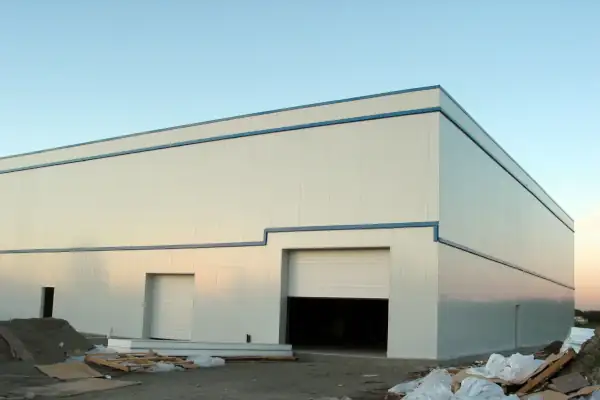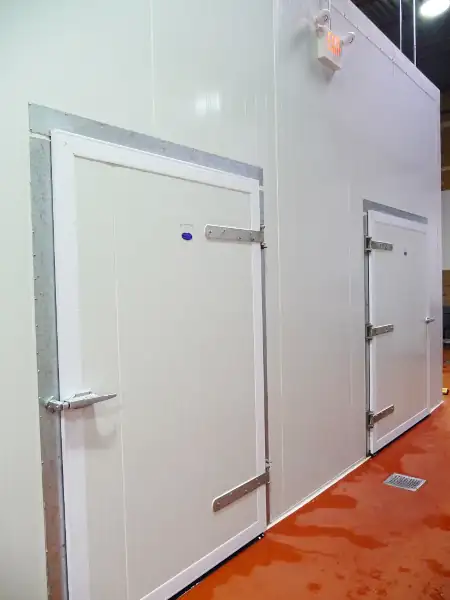Insulated Metal Panels
Korolite® Insulated Metal Panels offer high performance building solutions that lower emissions, reduce lifetime costs and enhance indoor environmental quality. Energy-efficient and airtight insulated metal panels help create advanced building envelopes and cold-storage units. Environmentally responsible, continuous insulation cores are sandwiched between pre-painted steel facings. Build attractive, sustainable, and budget-friendly facilities in record times by combining insulation, finishes, air, vapour & water-resistive barriers.


Korolite® Insulated Metal Panels are highly versatile, available with various finished looks, and fast to install onto structural framing. Custom-manufactured to the specified lengths and thicknesses, the lightweight modular panels arrive at the jobsite ready to place. Unique interlocks help ensure continuous insulation and minimal air leakage with sealant applied between panels at the jobsite.
Technical Information
Product Catalog PDF Typical Details DWG Typical Details Handling Instructions
Korolite® Insulated Metal Panels have been tested for reliable performance and meeting building codes:
- Air Permeance & Water Penetration ASTM E283 & E331
- Room Fire Growth Certificate of Compliance CAN/ULC-S138 UL Listing
- Surface Burning Characteristics of Metal Panels with typical joints and without joints CAN/ULC-S102
- Intertek Listed & Inspected
- Canadian Food Inspection Agency (CFIA) Approval with and without FRP
- Uniform & Concentrated Loads for Floor Panels
- Foam Cores Code Evaluation Report CAN/ULC-S701.1 & ASTM C578
Korolite® Insulated Metal Panel Properties
The panels are 2-11" thick [50-280mm], 48" [1219mm] or 45-¾" [1162mm] wide and custom-cut to lengths per approved designs. The panels' facings are pre-painted, AZ50 aluminum-zinc coated or G90 galvanized steel in 26 or 24 gauge. They are bonded to the closed cell, expanded polystyrene (EPS) or graphite-enhanced EPS (GPS) insulation core with a specially formulated adhesive.
| Panel Thickness | mm | 50 | 102 | 152 | 203 | 254 | 280 |
|---|---|---|---|---|---|---|---|
| inch | 2 | 4 | 6 | 8 | 10 | 11 | |
| Thermal Resistance1,2 typical per ASTM C518 or C177 at mean temperatures of: | |||||||
| R-value with EPS Cores ft²•hr•°F/BTU |
@ 75°F | 8.08 | 15.4 | 23 | 31 | 39 | 42 |
| @ 40°F | 8.8 | 16.7 | 25 | 33 | 42 | 46 | |
| @ 25°F | 9.2 | 17.4 | 26 | 35 | 44 | 48 | |
| RSI with EPS Cores m²•°C/W |
@ 24°C | 1.4 | 2.71 | 4.07 | 5.42 | 6.78 | 7.46 |
| @ 4.4°C | 1.55 | 2.94 | 4.41 | 5.88 | 7.34 | 8.08 | |
| @ -4°C | 1.62 | 3.06 | 4.6 | 6.13 | 7.66 | 8.43 | |
| R-value with GPS Cores ft²•hr•°F/BTU |
@ 75°F | 9.4 | 19 | 28.2 | 38 | 47 | 52 |
| @ 40°F | 9.8 | 20 | 29.4 | 39.2 | 49 | 54 | |
| RSI with GPS Cores m²•°C/W |
@ 24°C | 1.66 | 3.31 | 4.97 | 6.62 | 8.28 | 9.1 |
| @ 4.4°C | 1.73 | 3.45 | 5.18 | 6.9 | 8.63 | 9.49 | |
| Air Permeance tested | ASTM E283 | 0.002 l/(s•m²) at 300 Pa 0.0004 CFM/ft² at 6.26 psf |
|||||
| Water Penetration tested | ASTM E331 | Passed at 137 Pa | |||||
| Fire Growth of Insulated Building Panels | CAN/ULC-S138 | Passed in Full-Scale Room Configuration | |||||
| Surface Burning Characteristics for Panels with Facings | |||||||
| without joints | CAN/ULC-S102-07 | Flame-Spread Rating 5 Smoke Developed Classification 175 |
|||||
| with typ. joints incl. exposed sealant | CAN/ULC-S102-18 | Flame-Spread Rating 65 Smoke Developed Classification 310 |
|||||
| Panel Cores: Korolite® Expanded Polystyrene (EPS or GPS) | |||||||
| Canada Type | CAN/ULC-S701.1 | 2 | 1 | 1 | 1 | 1 | 1 |
| USA Type | ASTM C578, ICC-ES AC12 | II | I | I | I | I | I |
| Panel Weights with 26 ga. facings |
lbs/sqft | 2.18 | 2.35 | 2.54 | 2.72 | 2.91 | 3.0 |
| kg/m² | 10.6 | 11.5 | 12.4 | 13.3 | 14.2 | 14.65 | |
¹ Foam core insulation values are calculated by extrapolation of 1 inch thick samples. ² R means resistance to heat flow. The higher the R-value, the greater the insulating power.
Additional Properties of EPS
Expanded Polystyrene (EPS) has no nutritional value for organisms and resists mold & fungi growth per ASTM C1338. To protect against animals place adequate physical barriers such as bug-screens or membranes around EPS.
Max. Service Temperature: Long-Term Exposure 75°C [167°F], Intermittent Exposure 80°C [176°F]
Thermal Expansion coefficient:
Solubility: Insoluble in water and in general chemically inert. EPS dissolves in hydrocarbons (e.g. fuels, oils, tar), organic solvents (e.g. acetone/ketones, benzene, paint thinner), ethers, esters, aldehydes and amines. Capillarity: None
UV-light surface degradation: white EPS can be exposed to direct sunlight for a few weeks. Prolonged exposure to ultraviolet light creates a yellow dust on the surface of EPS products which has negligible impact on the products' properties but may require removal before adhering other materials such as stucco or self-adhesive membranes.
Surface Burning Characteristics Canada CAN/ULC-S102.2: Flame-Spread Rating ≤295, Smoke Developed Classification over 500. USA Class A (NFPA 101), ASTM E84 (UL 723)ª: Flame Spread Index ≤25, Smoke-Developed Index ≤450 up to 6" thick
Limiting Oxygen Index: min. 24% per ASTM D2863. Airfoam's EPS for construction applications contains a polymeric (non-HBCD) fire retardant modifier.
CAUTION: EPS products are combustible and must not be exposed to excessive heat, sparks, open flames, or any other sources of ignition. A protective barrier or thermal barrier is required as specified in the appropriate building code. If stored/used in closed containers, confined, or low-lying areas, ensure adequate ventilation to prevent accumulation of flammable pentane vapours. Prevent inhalation of smoke, fumes or dust from burning or fabrication activities. GHS Classification: Non-Hazardous, see SDS
ª Ceiling measurement only, conducted through determination of flame spread index and smoke-developed index with the removal of any contribution of molten materials ignited on the floor of the Steiner tunnel.
Deformation due to Thermal Radiation: unprotected, gray GPS will deform when exposed to direct or reflected sunlight or other radiant heat sources. Keep GPS covered using opaque tarp, reflective covers or suitable indoor storage until finishes are installed.



















